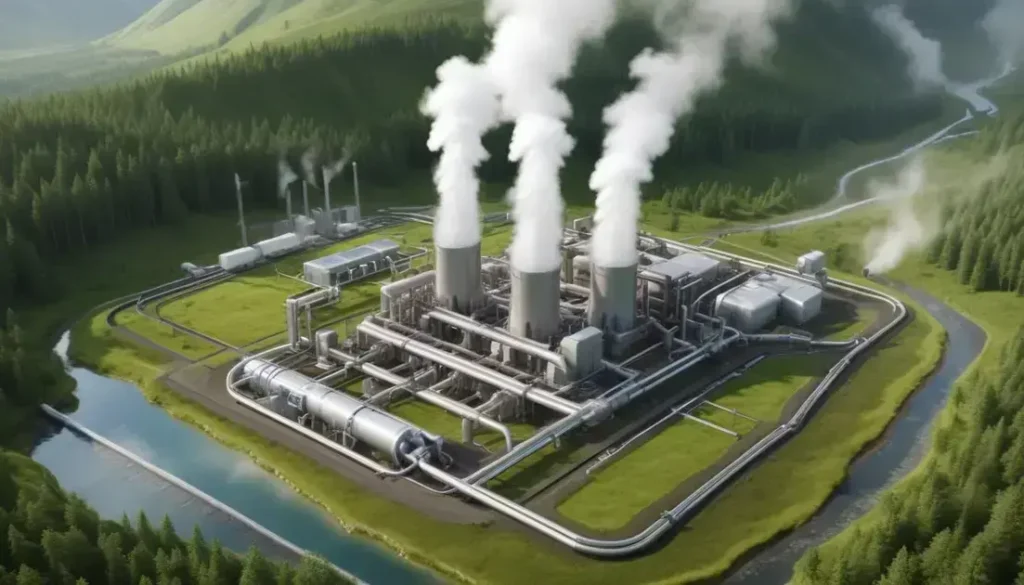Nuclear energy is integral to the UK’s strategy for achieving net-zero emissions by 2050, providing a stable, low-carbon power source that complements renewable energy and supports economic growth through job creation and innovation.
Nuclear power is at the forefront of the UK’s energy strategy. With the Sizewell C project gaining momentum, the future of clean energy is optimistic. What does this mean for UK businesses?
Sizewell C’s Financial Backing
The financing of Sizewell C is a crucial aspect of advancing the UK’s nuclear energy ambitions. With a projected cost exceeding £20 billion, securing robust financial backing is essential. The project has garnered support from both private investors and government initiatives, reflecting a collective commitment to clean energy.
Investment Structure: The funding for Sizewell C is expected to involve a mix of equity and debt financing. This structure aims to balance risk while facilitating the large capital required. Furthermore, the inclusion of key private firms alongside governmental support showcases the strategic partnership model that is becoming common in energy projects.
In addition to domestic investments, international funds are being attracted, indicating a broad interest in the UK’s nuclear prospects. This influx of capital is critical not only for construction but also for driving technological innovation within the project.
Financial Implications for the UK: The successful funding of Sizewell C is pivotal for job creation and energy independence. As construction progresses, it is anticipated that thousands of jobs will be created, boosting local economies. The project represents a significant step towards a sustainable energy future, reducing reliance on fossil fuels and enhancing the UK’s energy security.
Impact on UK Energy Security
The impact on UK energy security due to the Sizewell C project cannot be understated. As the UK seeks to reduce dependence on fossil fuels, Sizewell C represents a significant shift towards sustainable energy. This nuclear power station will provide reliable energy, contributing to the nation’s supply stability.
By integrating nuclear energy into the UK’s energy mix, the project aims to enhance energy resilience. The ability to generate consistent power contrasts with the intermittent nature of renewable sources such as wind and solar. With advancements in nuclear technology, Sizewell C promises to deliver clean energy around the clock.
Moreover, this facility is projected to generate approximately 7% of the UK’s electricity needs. This substantial output will bolster the UK’s capacity to meet its future energy demands while adhering to strict carbon reduction targets. By increasing domestic energy production, the UK can also minimise its reliance on energy imports, thereby strengthening national security.
The development of Sizewell C highlights the importance of strategic investments in robust energy infrastructure. This project not only helps to secure energy supply but also creates an opportunity for job growth in various sectors, from construction to long-term operational roles.
Creating Jobs in the Energy Sector
The Sizewell C project is poised to be a significant driver in job creation within the energy sector. With construction expected to employ thousands, the project aims to stimulate economic growth in local communities. This influx of opportunities will not only bolster the regional economy but also provide a skilled workforce for future energy initiatives.
Jobs generated by Sizewell C will encompass a wide range of roles, from engineering and technical positions to construction labour and administrative functions. Furthermore, this project will require ongoing support roles once operational, creating a sustainable employment pipeline for years to come.
The government and project developers emphasise partnerships with local training organisations to ensure that residents can gain the skills necessary for these new roles. This focus on upskilling aims to meet the evolving demands of the energy sector, particularly as the UK transitions to a low-carbon economy.
In addition to direct job creation, Sizewell C is expected to have a knock-on effect, boosting employment in related sectors such as transport, services, and suppliers. The collaboration between various industries highlights the interconnected nature of the energy economy, making Sizewell C a cornerstone for future growth.
Future of Nuclear in the UK
The future of nuclear energy in the UK is a topic of growing significance as the nation strives to meet its environmental targets. With projects like Sizewell C, the UK is positioning itself as a leader in sustainable energy production. Nuclear power is expected to play a pivotal role in achieving a low-carbon energy system while ensuring energy security.
Innovations in nuclear technology promise safer and more efficient power generation. Advanced reactors, including Small Modular Reactors (SMRs), are being explored. These designs not only reduce construction costs but also minimize waste, making them attractive options for the future.
The government actively supports nuclear energy as part of its energy strategy. Recent policies encourage investment in new nuclear projects while ensuring stringent safety measures are upheld. The integration of nuclear with other renewable sources, like wind and solar, can provide a stable and balanced energy mix.
Furthermore, nuclear energy can foster job creation and technological advancements. As new facilities are developed, they will require skilled workers, enhancing opportunities in the engineering and construction sectors. This holistic approach towards nuclear power signifies a commitment not only to sustainability but also to economic growth in the UK.
Comparison with Renewable Energy Sources
The comparison between nuclear energy and renewable energy sources reveals distinct advantages and challenges for each. While renewable energies, such as wind and solar, are celebrated for their sustainability, they often rely on intermittent generation, which can lead to supply inconsistencies.
Nuclear power, in contrast, provides a stable and continuous energy output. This reliability is crucial for meeting base-load energy demands, ensuring that the grid remains stable regardless of weather conditions. Unlike renewables, nuclear plants can produce energy around the clock, thus supporting overall energy security.
However, the key challenge for nuclear energy lies in perception and safety concerns. Issues surrounding nuclear waste management and past incidents have led to public apprehension. In comparison, renewable sources are often perceived as safer and more environmentally friendly, despite some disadvantages like land use and ecological impacts.
When considering emissions, both nuclear and renewables significantly outperform fossil fuels. Nuclear plants have minimal greenhouse gas emissions during operation, positioning them as a substantial part of a low-carbon energy strategy. As the UK transitions towards a more sustainable energy landscape, understanding these comparisons is critical in shaping future policies and investments.
Nuclear Waste Management Considerations
The topic of nuclear waste management is critical in discussions surrounding the future of nuclear energy. As the UK invests in new nuclear facilities, addressing the long-term disposal of radioactive waste becomes paramount. Effective waste management ensures public safety and environmental protection, which are vital for gaining public support for nuclear projects.
Nuclear waste can be categorised into low, intermediate, and high-level waste, each requiring specific handling and disposal methods. High-level waste, primarily from spent nuclear fuel, poses the most significant challenge due to its longevity and radioactivity. Safe storage solutions, such as deep geological repositories, are being explored to isolate this waste from the biosphere for thousands of years.
Beyond storage, reprocessing spent fuel can significantly reduce waste volume and recover valuable materials. Such initiatives promote sustainability and resource efficiency, aligning with the UK’s broader environmental goals. Public engagement and transparency are essential in these processes, ensuring that communities are informed and consulted.
As the nuclear sector evolves, incorporating advanced technologies for waste management will be crucial. Continuous research and development in this field will help mitigate risks and enhance safety within the nuclear industry, paving the way for a sustainable energy future.
The Role of Advanced Nuclear Technologies
The emergence of advanced nuclear technologies is redefining the landscape of energy production in the UK. These innovations address many concerns associated with traditional nuclear power, enhancing safety, efficiency, and sustainability. One prominent development is the rise of Small Modular Reactors (SMRs), which offer a compact and scalable solution to nuclear energy generation.
SMRs are designed with advanced safety features, utilising passive safety systems that reduce the risk of accidents. Their smaller size allows for quicker construction and less capital investment, making nuclear energy more accessible and economically viable. Additionally, these reactors can integrate seamlessly with renewable energy sources, providing reliable power even when the sun isn’t shining or the wind isn’t blowing.
Another breakthrough is the use of Generation IV reactors, which focus on sustainability by reusing spent fuel and minimising nuclear waste. These reactors incorporate innovative designs, such as fast neutron reactors, which significantly improve fuel efficiency.
Advanced technologies also pave the way for nuclear energy to play a pivotal role in achieving the UK’s net-zero emissions targets. By coupling these innovations with a commitment to research and development, the UK can position itself as a leader in the global nuclear energy sector, contributing to a cleaner and more sustainable energy future.
Government’s Energy Security Strategy
The government’s energy security strategy is pivotal in shaping the future of energy production in the UK. With increasing concerns over climate change and energy independence, the strategy focuses on diversifying energy sources and enhancing resilience against potential disruptions. Nuclear energy plays a crucial role in this strategy due to its ability to provide a stable and reliable power supply.
One of the main objectives is to reduce dependence on fossil fuels while increasing the share of low-carbon energy. By investing in nuclear power, the government aims to secure a steady energy supply that can complement intermittent renewable sources such as wind and solar. This dual approach ensures that energy demand is met consistently.
Additionally, the strategy outlines investments in infrastructure and technology to support energy transition goals. Developing new nuclear facilities, such as Sizewell C, aligns with the government’s aim to boost energy self-sufficiency while creating jobs and fostering economic growth.
Public engagement and transparency are also critical components of this strategy. By keeping communities informed and involved in energy projects, the government hopes to build trust and ensure broader support for nuclear initiatives. This holistic approach will help bolster the UK’s energy security in a rapidly evolving global landscape.
Long-term Economic Implications
The long-term economic implications of investing in nuclear energy, particularly through projects like Sizewell C, are significant for the UK. By strategically enhancing its nuclear capacity, the government aims to create a stable energy environment conducive to economic growth. This energy stability is essential for attracting businesses and fostering innovation across various industries.
One of the primary benefits of nuclear energy investment is job creation. Thousands of direct and indirect jobs will emerge during the construction and operation of new facilities. These opportunities span various sectors, including engineering, construction, and maintenance, leading to a boost in local economies.
Additionally, a reliable energy source like nuclear power can reduce energy costs in the long run. With nuclear energy providing a consistent base-load power supply, businesses can benefit from lower electricity prices, enhancing their competitiveness both domestically and internationally. This affordability may also encourage more investments in manufacturing and technology sectors.
Moreover, investing in nuclear energy aligns with the UK’s commitment to reducing carbon emissions. As the country transitions to a low-carbon economy, holding a significant share of nuclear power can help facilitate the achievement of governmental climate targets, unlocking potential funding and collaboration on sustainable projects.
Community Perspectives on Nuclear Energy
Understanding community perspectives on nuclear energy is essential for the successful implementation of nuclear projects like Sizewell C. Public acceptance hinges on the perceived safety, environmental impact, and economic benefits associated with nuclear power. Engaging with local communities fosters trust and inclusion, key components for long-term support.
Many community members express concerns about the potential risks linked to nuclear power, particularly regarding safety and waste management. Addressing these concerns through transparent communication and education initiatives is vital. Public forums and informational campaigns can help demystify nuclear energy and illustrate its role in achieving a low-carbon future.
On the other hand, numerous communities recognise the potential economic advantages that nuclear energy can bring, such as job creation and local investments. The construction and operation of a nuclear facility provide opportunities for skilled workers and can stimulate local businesses. These benefits create a dialogue about the positive contributions of nuclear energy to regional economies.
Furthermore, involving community representatives in decision-making processes ensures that local voices are heard. By fostering dialogue, the nuclear industry can build strong relationships with communities, ultimately leading to a more robust and sustainable energy strategy that aligns with public sentiment.
Aiming for Net Zero by 2050
The UK has set an ambitious target of net zero greenhouse gas emissions by 2050, a commitment that is pivotal for combating climate change. Achieving this target necessitates a comprehensive strategy that includes a significant role for nuclear energy. With its low carbon footprint, nuclear power is integral to meeting energy demands while reducing overall emissions.
To align with this net zero goal, the government plans to expand its nuclear capacity by investing in new facilities and technologies. Projects like Sizewell C are designed not only to provide sustainable electricity but also to support the transition towards a carbon-neutral economy. This investment in nuclear energy can significantly decrease reliance on fossil fuels, thus contributing to a cleaner energy mix.
In addition to generating low-carbon electricity, nuclear facilities can enhance energy security and stability in the grid, especially as more renewable energy sources like wind and solar are integrated. This balanced energy strategy is essential as the UK aims to decarbonise its power sector by 2035, facilitating progress towards the 2050 target.
Achieving net zero will also require public support and engagement. Educating communities about the benefits of nuclear energy and its role in a sustainable future is crucial for fostering acceptance and collaboration in the transition journey.
Conclusion
The journey towards a sustainable energy future in the UK is underpinned by the vital role of nuclear energy. By aiming for net zero emissions by 2050, the UK is not only advancing its energy strategy but also addressing the global challenge of climate change.
Nuclear power offers a reliable, low-carbon solution that complements renewable energy sources, ensuring a stable and secure energy supply. Investments in advanced technologies and new facilities underscore the commitment to a cleaner energy mix that can support economic growth and create jobs.
Community engagement and support are essential for the success of these initiatives. Educating the public about the benefits of nuclear energy will foster acceptance and collaboration, making it easier to achieve the ambitious goals set forth.
Ultimately, by embracing nuclear energy as part of its broader energy strategy, the UK can lead the way in building a sustainable and prosperous future for generations to come.
Frequently Asked Questions
What role does nuclear energy play in the UK’s net-zero strategy?
Nuclear energy provides a reliable, low-carbon power source that supports the UK’s goal of achieving net-zero greenhouse gas emissions by 2050.
How does the government plan to enhance nuclear capacity?
The government is investing in new nuclear facilities and advanced technologies to increase the share of nuclear energy in the national grid.
What are the economic benefits of nuclear energy for local communities?
Nuclear energy creates jobs during the construction and operation phases, stimulates local businesses, and provides long-term economic growth.
How can communities engage with nuclear energy projects?
Communities can participate through public forums, consultations, and educational initiatives that inform them about the benefits and safety of nuclear energy.
What measures are taken to ensure the safety of nuclear power plants?
Nuclear power plants implement advanced safety features and undergo rigorous regulatory oversight to ensure their operations are safe and secure.
Why is public acceptance important for nuclear energy initiatives?
Public acceptance is vital for the success of nuclear projects, as community support influences government policies and the future of energy strategies.


